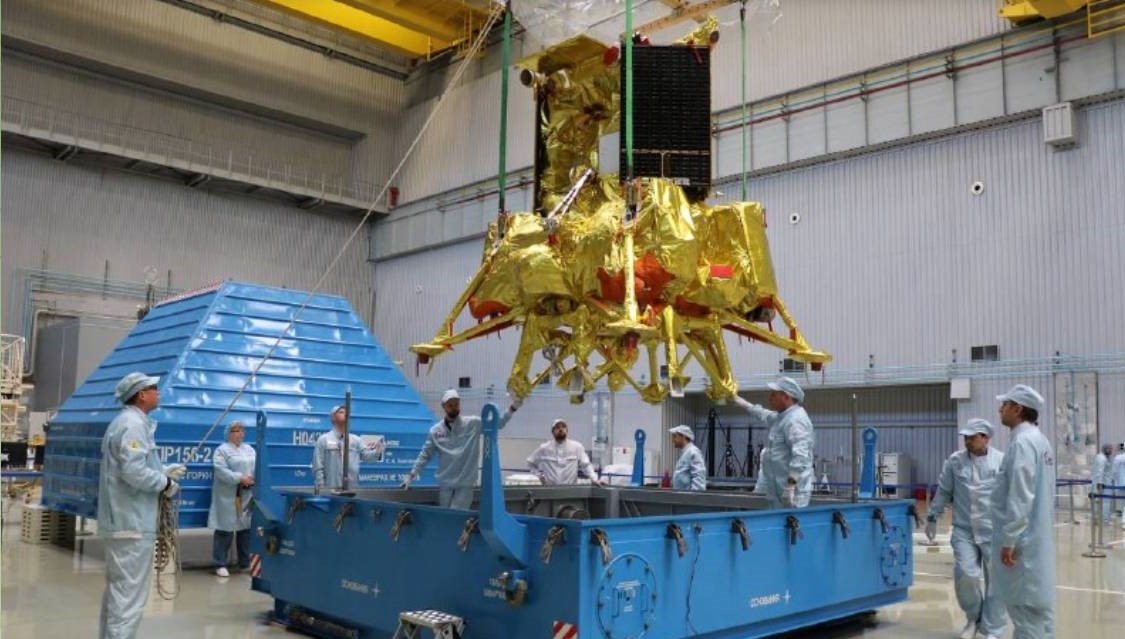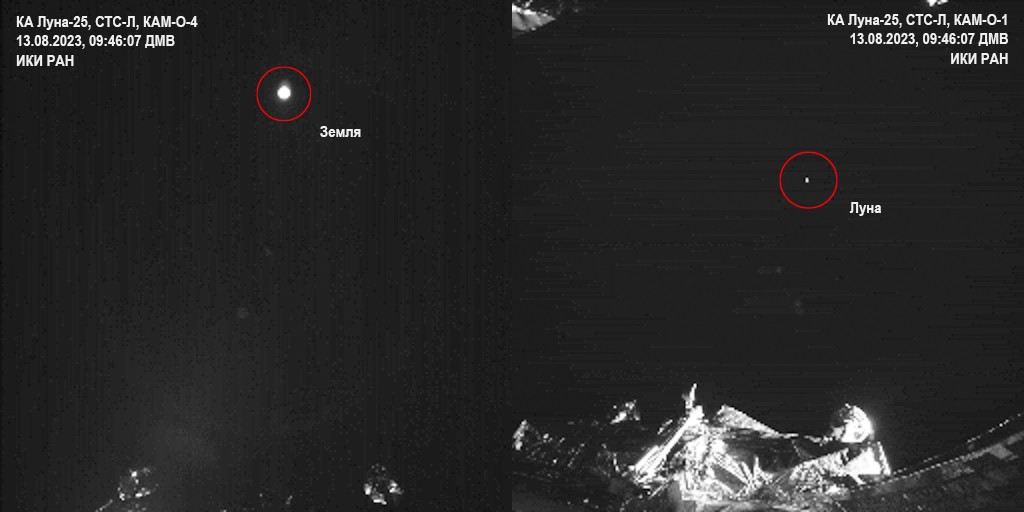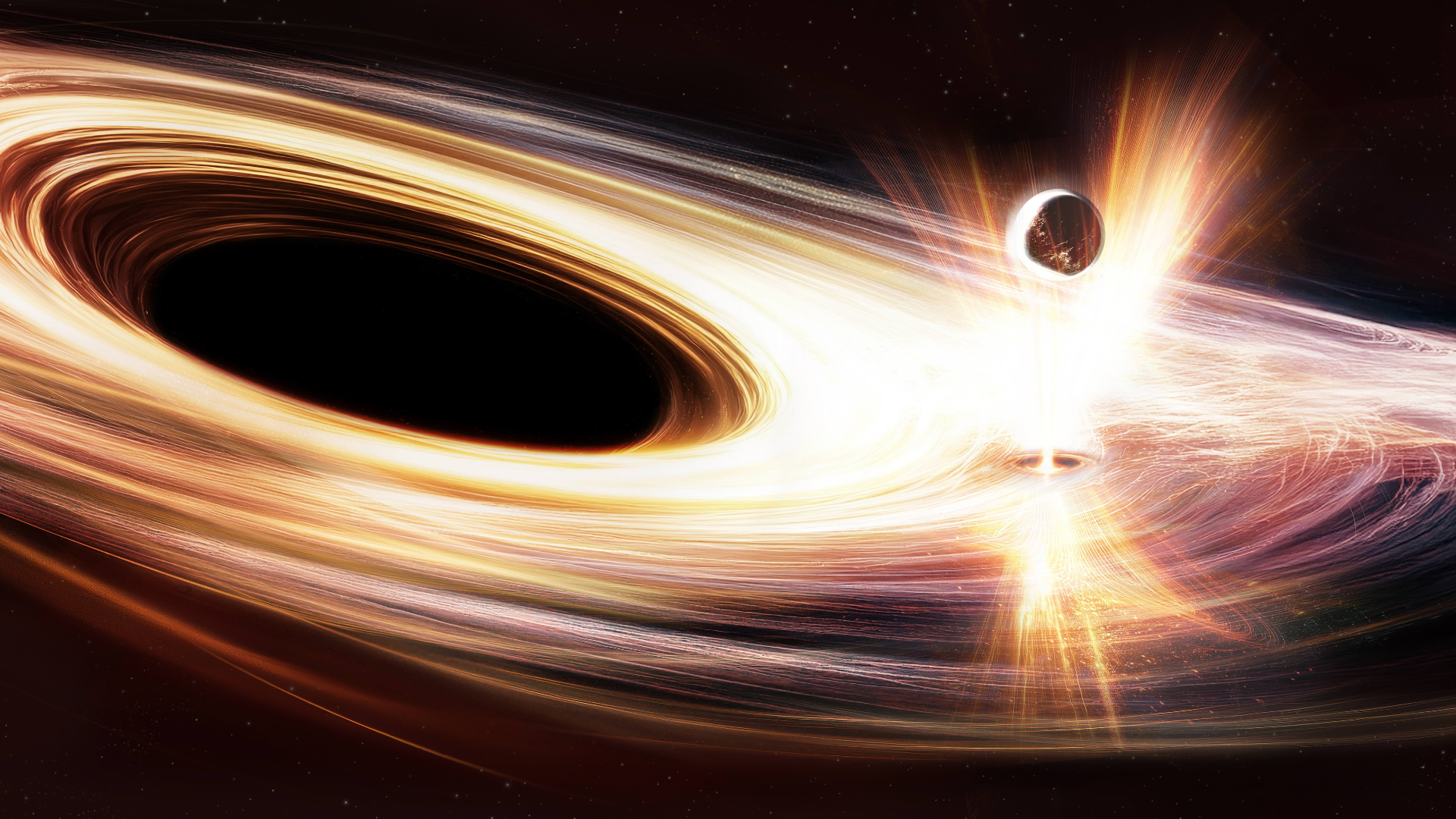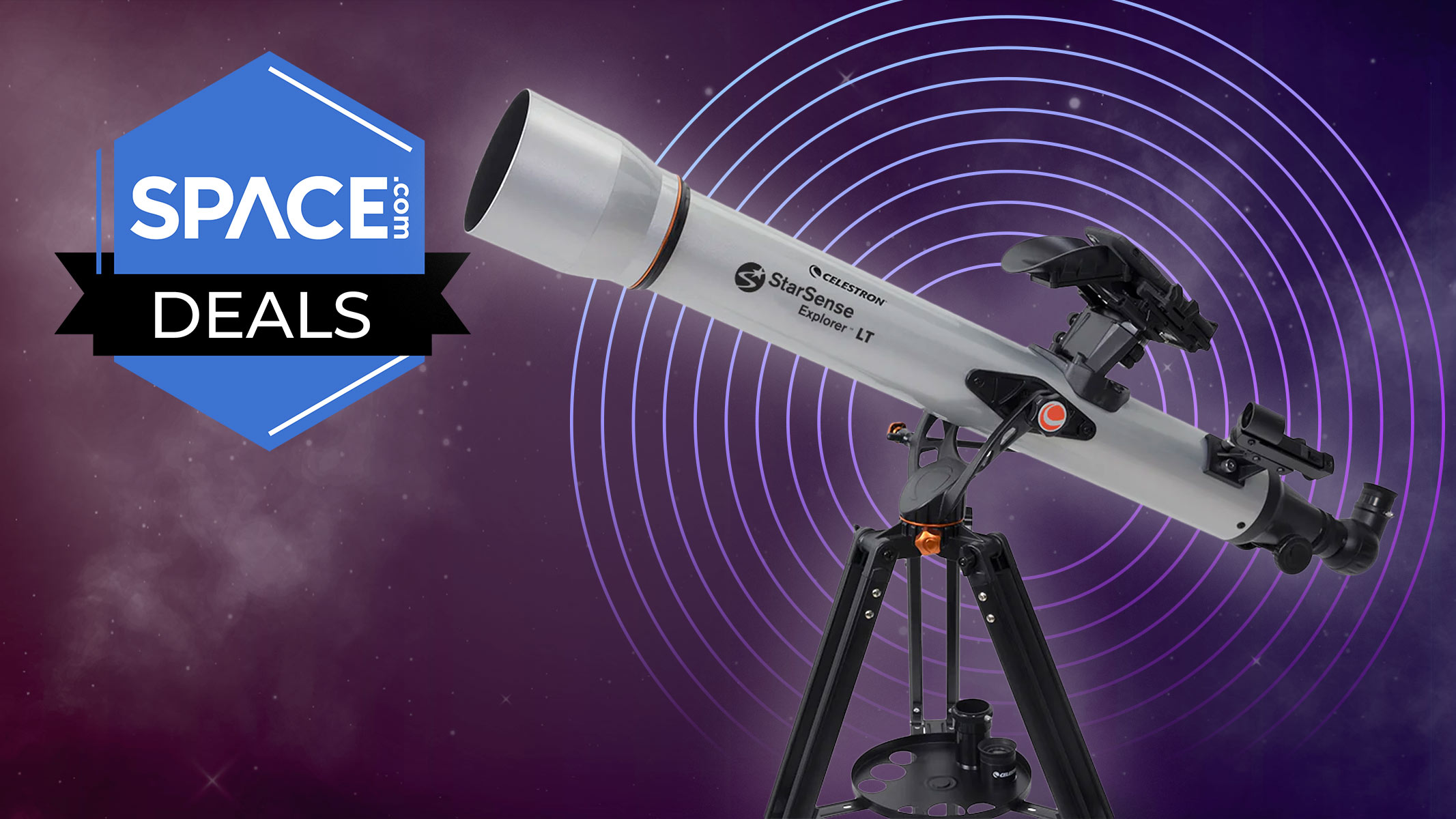Russia says its Luna-25 lunar lander has crashed into the moon
Luna-25, Russia's first moon mission in 47 years, was the vanguard of a planned series of lunar probes.
Russia's first moon lander in 47 years has crashed into the lunar surface, the country's space agency reported on Sunday (Aug. 20).
The Luna-25 lander, which Russia had hoped would land at the south pole of the moon as early as Monday (Aug. 21), crashed into the moon after an orbital maneuver went wrong yesterday (Aug. 19), officials with Russia's Roscosmos space agency said.
"At about 14:57 Moscow time [on Aug. 19], communication with the Luna-25 spacecraft was interrupted," Roscosmos wrote in an update on Telegram today (in Russian; translation by Google). "The measures taken on August 19 and 20 to search for the device and get into contact with it did not produce any results."
Related: Russia launches Luna-25 moon lander, its 1st lunar probe in 47 years
A preliminary analysis suggests that the wayward orbital maneuver sent Luna-25 into an unexpected trajectory, one in which the moon lander "ceased to exist as a result of a collision with the lunar surface," Roscosmos wrote.
Luna-25 was hoped to be a major space milestone for Russia. The last moon probe from the country was Luna-24 in 1976, when Russia was still part of the Soviet Union. That probe landed in the moon's Sea of Crises (Mare Crisium) and ferried a sample back to Earth, a few years after the last human moon landing by NASA in 1972. Luna-25 was targeted to touch down near the south pole of the moon, where the probe was to spend one Earth year searching for water ice and performing a number of scientific investigations.
Luna-25 launched on Aug. 10 and sent its first in-space photos back to Earth on Aug. 13, including selfies with the moon and Earth in the background. The mission swiftly reached lunar orbit, a milestone that Roscosmos announced on Aug. 16.
The spacecraft's primary landing zone was a region called Boguslawsky Crater, but there were two backup landing spots also available: Southwest of Manzini Crater, and south of Pentland A Crater.
Get the Space.com Newsletter
Breaking space news, the latest updates on rocket launches, skywatching events and more!

Aside from hunting water ice, Luna 25's main science goals included examining the regolith and rocks around it, looking at the wispy lunar atmosphere and testing out technology for future landings on the moon.
Russian aerospace company NPO Lavochkin designed and built the lander, which had two major parts: a landing platform with a propulsion system; and landing gear, including a velocity and range meter for use during landing. Also on the lander was a non-pressurized instrument container for items such as solar panels, radiators, antennas, television cameras, a power source and scientific equipment.
The loss of Luna-25 could be a major blow to Russia's plans to fly a series of moon missions and its effort to develop a permanent crewed based on the moon with China.
Roscosmos plans to follow Luna-25 with a lunar orbiter, called Luna-26, and then two more landing missions: Luna-27, which will send a drilling rig to the lunar surface; and Luna-28, a sample-collection mission that aims to return material from the moon's polar regions to Earth.
Related: Missions to the moon: Past, present and future

Those subsequent moon missions will likely be delayed due to Luna-25's failure, as Roscosmos investigates to find the root cause of the probe's crash into the moon. The mission had already been delayed by technical issues and challenges due to sanctions over Russia's ongoing war on Ukraine that led the European Space Agency — which was to provide a precision camera to help Luna-25 land — to pull out of cooperative space projects with the country.
Roscosmos officials said Sunday that they have already formed a team to investigate the crash of Luna-25.
"A specially formed interdepartmental commission will deal with the issues of clarifying the reasons for the loss of the moon [lander]," Roscosmos wrote in the Telegram update.
Russia is not alone in reaching for the moon's south pole. India's Chandrayaan 3 lander is also on track to touch down in that area very soon, as early as Aug. 23 or Aug. 24. NASA also has the south pole in sight, as a key part of its Artemis program to put people and landers on the moon in the coming decade.
NASA plans to land the crewed Artemis 3 mission near the south pole in late 2025 or 2026, provided that Artemis 2 loops around the moon as planned with its crew in late 2024 and that the spacesuits and lander (SpaceX's new Starship vehicle) are ready. NASA also has help fund a series of commercial robotic landers, some of which may touch down on the moon as soon as this year.
Editor's note: This story was updated at 9:25 a.m. EDT to include the statement from Roscomos that Luna-25 had crashed into the moon. Space.com Editor-in-Chief Tariq Malik contributed to this report.
Join our Space Forums to keep talking space on the latest missions, night sky and more! And if you have a news tip, correction or comment, let us know at: community@space.com.

Elizabeth Howell (she/her), Ph.D., was a staff writer in the spaceflight channel between 2022 and 2024 specializing in Canadian space news. She was contributing writer for Space.com for 10 years from 2012 to 2024. Elizabeth's reporting includes multiple exclusives with the White House, leading world coverage about a lost-and-found space tomato on the International Space Station, witnessing five human spaceflight launches on two continents, flying parabolic, working inside a spacesuit, and participating in a simulated Mars mission. Her latest book, "Why Am I Taller?" (ECW Press, 2022) is co-written with astronaut Dave Williams.
- Tariq MalikEditor-in-Chief
-
Unclear Engineer "Roscosmos boss Yuri Borisov had said the venture would be 'risky', telling President Vladimir Putin face to face in June that the probability of it succeeding was 'around 70 percent'." (from that other Internet site)Reply
I wonder how much international politics is pushing scientists into schedules that they find uncomfortable and more risky than desired.
It would be nice if humans could get together and work collectively to explore space. But, it seems that progress has mostly been coming from geopolitical adversaries getting into politically motivated "races".
Maybe things will change, now that their is serious commercial incentive to develop space capabilities and facilities. But, maybe we will just substitute "races" by commercial competitors for races between governments.
Anyway, condolences to the Russian scientists who worked on the Luna 25 project.
And best wishes for the Indian group as they attempt the same, risky feat in the next few days. -
Classical Motion If Russian academia and engineering had been supported likes ours over the last 5 decades, we would have some very serious competition. In many fields. I don't believe this was a failure of talent but a failure of support and resources. Just an opinion.Reply -
spacing_out_in_space Reply
india went through the same in 2019!! feel bad for the people involved thoughAdmin said:Luna-25, which Russia had hoped would land at the south pole of the moon, crashed into the moon on Aug. 19 after an orbital maneuver went wrong.
Russia says its Luna-25 lunar lander has crashed into the moon : Read more -
Unclear Engineer Reply
I agree that Russian science and rocket manufacture is not second class.Classical Motion said:If Russian academia and engineering had been supported likes ours over the last 5 decades, we would have some very serious competition. In many fields. I don't believe this was a failure of talent but a failure of support and resources. Just an opinion.
But, while funding levels are always important constraints, there is also the goal-setting actions of the political parts of the system that affect what projects get whatever funding is available.
The U.S. reached the Moon with humans first, and that was the goal achieved, so the U.S. went to low Earth orbit continuous occupancy as the next goal. I guess the idea was to make a robust system before going to the Moon in a more continuous manner, but that tended to eat-up all of the available funding. Apollo got cannibalized by the Space Shuttle, which is now providing parts for SLS. The continuous Earth orbit occupancy needed a flexible, reliable and cost-effective launch system, and the Space Shuttle just wasn't it. It looks like SpaceX has finally delivered reusability with an entirely different approach than the Russian or American governments worked on.
At least some funding was provided for non-human payloads, such as Mars and beyond probes, plys Webb. But, that too was long delayed.
If China had not stated its goal of going to the Moon, I don't think Artemis would be getting scheduled for this decade. China has the scientists, R&D capabilities and manufacturing infrastructure to succeed, and maybe pretty quickly, because they have the political control and desire for putting Chinese on the Moon.
I just hope neither the Chinese nor the Americans push their schedules too hard and end up with fatal blunders. That is the type of outcome that tends to damage the political will to get the project done. -
Denny_Crane's_Interwev Reply
It comes down to incompetence, combined with lack of funds, lack of modern electronics, and theft from corruption.Classical Motion said:It always comes down to the leaders and managers. -
Unclear Engineer (from that other Internet site:)Reply
"The engine supposed to put the spacecraft into pre-landing orbit 'worked for 127 instead of the planned 84 seconds. This was the main cause of the probe's crash,' Borisov explained."
"The chief of the Russian space agency Roscosmos on Monday advocated for Russia to stay in the lunar race, a day after announcing its mission had crashed."
That makes it sound like there is some internal talk about not trying again. It certainly doesn't sound like they have more equipment waiting in the wings for another attempt. I wonder if they will decide to "join" with the Chinese to save money (and "face"}.









